Ecco renal - Study guides, Class notes & Summaries
Looking for the best study guides, study notes and summaries about Ecco renal? On this page you'll find 27 study documents about Ecco renal.
Page 2 out of 27 results
Sort by
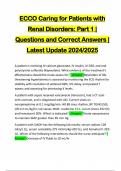
-
ECCO Caring for Patients with Renal Disorders: Part 1 | Questions and Correct Answers | Latest Update 2024/2025
- Exam (elaborations) • 5 pages • 2024
- Available in package deal
-
- $11.99
- + learn more
ECCO Caring for Patients with Renal Disorders: Part 1 | Questions and Correct Answers | Latest Update 2024/2025 A patient is receiving IV calcium gluconate, IV insulin, IV D50, and oral polystyrene sulfonate (Kayexalate). What evidence of the treatment's effectiveness should the nurse assess for? - Answer -Resolution of lifethreatening hyperkalemia is assessed by monitoring the ECG rhythm for stability with resolution of widened QRS, IVC delay, and peaked T waves; and assessing for de...
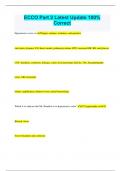
-
ECCO Part 2 Latest Update 100% Correct
- Exam (elaborations) • 13 pages • 2023
- Available in package deal
-
- $9.99
- + learn more
ECCO Part 2 Latest Update 100% Correct Hypertensive crisis s/s fatigue, malaise, weakness, and epistaxis chest pain, dyspnea, S3/4 heart sounds, pulmonary edema, HTN, increased HR, RR, and glucose CNS- headache, confusion, lethargy, coma, focal neurologic deficits, TIA, Encephalopathy renal- AKI, hematuria retinas- papilledema, blurred vision, retinal hemorrhage Which 4 s/s indicate that Mr. Hendrick is in hypertensive crisis? LV hypertrophy on ECG Blurred vision Severe headache and confu...
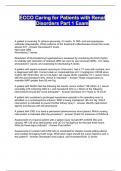
-
ECCO Caring for Patients with Renal Disorders Part 1 Exam
- Exam (elaborations) • 3 pages • 2023
- Available in package deal
-
- $9.99
- + learn more
ECCO Caring for Patients with Renal Disorders Part 1 Exam...
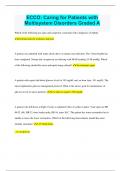
-
ECCO: Caring for Patients with Multisystem Disorders Graded A
- Exam (elaborations) • 6 pages • 2023
- Available in package deal
-
- $8.99
- + learn more
ECCO: Caring for Patients with Multisystem Disorders Graded A Which of the following are signs and symptoms consistent with a diagnosis of rhabdo profound muscle weakness and pain A patient was admitted with septic shock due to a urinary tract infection. The 3 hour bundle has been completed. Norepi and vasopressin are infusing with MAP trending 55-58 mmHg. Which of the following should the nurse anticipate being ordered? An inotropic agent A patient with sepsis had blood glucose levels of 185...
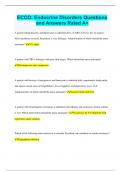
-
ECCO: Endocrine Disorders Questions and Answers Rated A+
- Exam (elaborations) • 7 pages • 2023
- Available in package deal
-
- $9.99
- + learn more
ECCO: Endocrine Disorders Questions and Answers Rated A+ A patient taking tricyclic antidepressants is admitted after a CABG; UO was low in surgery. After anesthesia reversal, the patient is very lethargic. Administration of which should the nurse anticipate? 3% saline A patient with TBI is lethargic with poor skin turgor. Which should the nurse anticipate? Desmopressin and vasopressin A patient with history of osteoporosis and bone pain is admitted with symptomatic bradycardia and reports re...
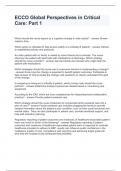
-
ECCO EXAM TEST COMPILATION BUNDLE 2024
- Package deal • 23 items • 2024
-
- $51.49
- + learn more
Exam (elaborations) ECCO Caring for Patients with Hematological Disorders - Part 1 Questions and Answers Latest Updated Exam (elaborations) ECCO Renal Questions and Answers Graded A+ Exam (elaborations) ECCO - Hemodynamic Monitoring of critically ill patients: part 2 Questions and Answers Graded A+ Exam (elaborations) ECCO Hematologic Disord
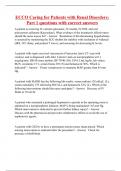
-
ECCO Caring for Patients with Renal Disorders: Part 1 questions with correct answers
- Exam (elaborations) • 4 pages • 2023
- Available in package deal
-
- $12.49
- + learn more
A patient is receiving IV calcium gluconate, IV insulin, IV D50, and oral polystyrene sulfonate (Kayexalate). What evidence of the treatment's effectiveness should the nurse assess for? - Answer Resolution of life-threatening hyperkalemia is assessed by monitoring the ECG rhythm for stability with resolution of widened QRS, IVC delay, and peaked T waves; and assessing for decreasing K levels. A patient with sepsis received vancomycin (Vancocin), had a CT scan with contrast, and is diagnose...
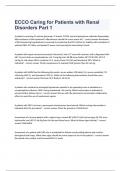
-
ECCO Caring for Patients with Renal Disorders: Part 1 exam questions and 100% correct answers
- Exam (elaborations) • 3 pages • 2023
-
- $13.99
- + learn more
A patient is receiving IV calcium gluconate, IV insulin, IV D50, and oral polystyrene sulfonate (Kayexalate). What evidence of the treatment's effectiveness should the nurse assess for? - correct answer Resolution of life-threatening hyperkalemia is assessed by monitoring the ECG rhythm for stability with resolution of widened QRS, IVC delay, and peaked T waves; and assessing for decreasing K levels. A patient with sepsis received vancomycin (Vancocin), had a CT scan with contrast, and is di...
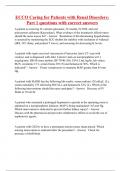
-
ECCO Caring for Patients with Renal Disorders: Part 1 questions with correct answers
- Exam (elaborations) • 4 pages • 2023
- Available in package deal
-
- $12.99
- + learn more
A patient is receiving IV calcium gluconate, IV insulin, IV D50, and oral polystyrene sulfonate (Kayexalate). What evidence of the treatment's effectiveness should the nurse assess for? - Answer Resolution of life-threatening hyperkalemia is assessed by monitoring the ECG rhythm for stability with resolution of widened QRS, IVC delay, and peaked T waves; and assessing for decreasing K levels. A patient with sepsis received vancomycin (Vancocin), had a CT scan with contrast, and is diagnose...
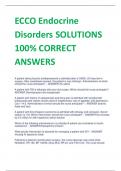
-
ECCO Endocrine Disorders SOLUTIONS 100% CORRECT ANSWERS
- Exam (elaborations) • 4 pages • 2024
-
- $10.49
- + learn more
ECCO Endocrine Disorders SOLUTIONS 100% CORRECT ANSWERS A patient taking tricyclic antidepressants is admitted after a CABG; UO was low in surgery. After anesthesia reversal, the patient is very lethargic. Administration of which should the nurse anticipate? - ANSWER 3% saline A patient with TBI is lethargic with poor skin turgor. Which should the nurse anticipate? - ANSWER Desmopressin and vasopressin A patient with history of osteoporosis and bone pain is admitted with symptomat...

Did you know that on average a seller on Stuvia earns $82 per month selling study resources? Hmm, hint, hint. Discover all about earning on Stuvia


